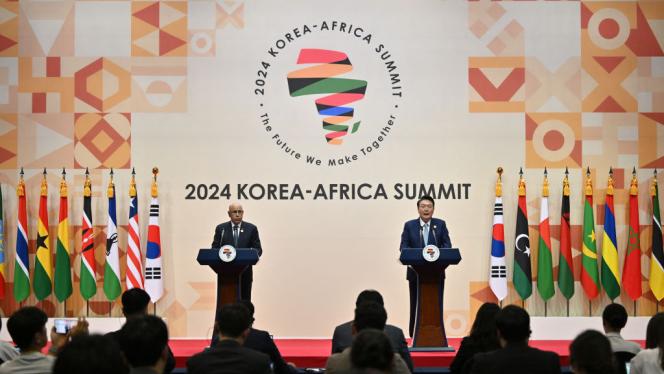Thursday 21 November 2024
Eyes on “critical minerals” at the South Korea–Africa Summit

South Korea is seeking critical minerals directly from African countries to protect its supply chains, but what are African countries getting in return?
South Korea’s strategy towards African countries focuses on securing critical mineral resources essential for maintaining its industry, which accounts for 3% of global manufacturing output, ranking 6th globally after India. This was evident during the first South Korea-Africa Summit held in Seoul on 4-5 June, which saw the participation of heads of state, senior officials, and ministers from 48 African countries. This is part of a broader strategy by South Korea to “de-risk” as ties between its primary security partner, the US, and its principal trade partner, China worsen. Yeo Han-Koo, a former trade minister wrote: “it is a legitimate rebalancing act for any country to hedge against the overdependence of its trade portfolio on one country and the possible weaponization of the overdependence.”
In 2023, 25 out of 33 “strategic minerals” South Korea relies on for its high-tech industry relied on China. Seoul appears keen to bypass China and reduce the exposure of its supply chains to geopolitical risk by cultivating ties with African countries directly.
Seoul appears keen to bypass China and reduce the exposure of its supply chains to geopolitical risk by cultivating ties with African countries directly.
The summit addressed these challenges, concluding with the signing of approximately 50 preliminary agreements, a framework, and a memorandum of understanding. South Korean President Yoon Suk Yeol committed to increasing South Korea’s developmental assistance to Africa to $10 billion by 2030. Additionally, he pledged $14 billion to finance exports to Africa and to encourage South Korean investments on the continent. This commitment was presented with a tone of empathy, highlighting South Korea’s shared past struggles and emphasising “South-South” cooperation.
Resource-for-loan
The summit occurred amid intensifying global competition for Africa, seen by major industrial nations as a source of critical and rare minerals vital for maintaining superiority in the fourth industrial revolution, as well as a significant consumer market with a population of 1.421 billion, representing 17.8% of the world’s population as of 2022.
Analysing the nature of the bilateral agreements signed at the summit and the position of African countries on the natural resource map provides insight into South Korea’s objectives.
Tanzania, led by President Samia Hassan, was a notable participant. Her official visit commenced on May 31 and continued through the summit’s conclusion. The Tanzanian delegation signed several agreements, including the initiation of negotiations for an Economic Partnership Agreement (EPA), a $2.5 billion infrastructure financing agreement, a $161.4 million agreement to finance a hospital in Zanzibar, and memorandums of understanding (MoUs) on the blue economy and cooperation in extracting and adding value to strategic minerals like cobalt and nickel. Tanzania has significant reserves of bauxite and graphite.
Furthermore, South Korea signed an MoU with Madagascar for cooperation in extracting and adding value to strategic minerals, following a similar agreement last year to deepen bilateral trade relations. Nickel accounted for 95% ofMadagascar’s annual exports to South Korea, valued at $150 million. Additionally, during the summit, Seoul signed a$1 billion financing agreement for developmental projects in Mozambique, whose fourth largest export market is South Korea with exports worth $466 million, 5.6% of its exports, according to thestatistics of 2023, comprising mainly raw materials like coal and mineral fuels.
South Korea also signed a $500 million infrastructure loan agreement with Uganda, a country rich in untappednatural resources such as oil, copper, gold, phosphate, and iron. Uganda’s formerly close ties with North Korea, South Korea’s adversary, suggest that this agreement also serves as a political manoeuvre to weaken North Korea’s international relations by offering financial and commercial alternatives.
It is evident from the above that South Korea is targeting African countries rich in rare and vital raw materials to secure the supply of essential industrial resources. However, there was no indication during the summit that South Korea intends to share its manufacturing expertise with these African nations.
Opening new markets
The summit’s final communiqué underscored the need to expand cooperation and share knowledge to enhance the development of industries related to vital minerals. This strategy leverages Africa’s resources and South Korea’s technological advancement, as expressed during the7th Korea-Africa Economic Cooperation (KOAFEC) ministerial conference last September.
Korean deputy prime minister and minister of economy and finance, Choo Kyung-ho,stated that combining Korea’s advanced technological industry with Africa’s growth potential would form a strong alliance capable of driving global recovery. Economist Kyung Min Kangnoted that Seoul aims to reduce its heavy reliance on China for essential minerals and contain China’s influence in the global manufacturing supply chain.
Trade between South Korea and Africa was a secondary focus of the summit, with a commitment of $14 billion to address thecontinent’s limited share of South Korea’s external trade and investment, which does not exceed 1-2%, amounting to $20.45 billion in trade in 2022 and approximately $9.2 billion in cumulative investments in 2019. Moreover, trade is unevenly distributed, with Egypt capturing the largest share, worth$3.9 billion and $800 million in investments, followed by South Africa with $3.16 billion in trade, predominantly in raw materials.
Viewing Africa as a single economic entity contradicts the reality that, despite successful political cooperation at continental and regional levels, it still has a long way to go in building economic unity to negotiate collectively with international powers competing for its natural resources.
Former Kenyan Ambassador to Seoul,Ngovi Kitau, suggested that the best approach would be to pursue a collective African free trade agreement with South Korea to give African agricultural exports a competitive chance. However, Seoul’s $14 billion export financing commitment may deepen the trade imbalance in its favour, as African countries lack resources to support their exports, and the limited Korean market for African agricultural and consumer products, with a population of only 51.6 million.
Partnership or bilateral relations?
The “Korean Rice Belt” initiative illustrates that many beneficiary countries possess varyingreserves of critical rare minerals, including Ghana, Senegal, Kenya, Gambia, Cameroon, Uganda, and Guinea. On a continental level, South Korea provided $600 million in energy investment under an agreement with the African Development Bank in 2021. Recently, the two parties signed a new $28.6 million financingagreement.
Seoul faces scrutiny over its partnership with Africa, based on its 2006 commitment during the Korean Initiative for Africa’s Development, the KOAFEC ministerial conference, and the Korea-Africa Forum (KOAF). Despite this commitment, South Korea’s investment portfolio has not exceeded $9 billion, and significant momentum in relations did not materialise until 2021, coinciding with heightened global competition for rare and critical minerals amid technological and industrial transformations.
Overall, African countries have shown limited responsiveness in leveraging international partnerships, as many commitments do not materialise due to solutions not aligning with African realities. Many African nations lack the essential conditions to maximise the benefits of collective cooperation, such as political stability, advanced economies, efficient and transparent institutions, and necessary infrastructure. Viewing Africa as a single economic entity contradicts the reality that, despite successful political cooperation at continental and regional levels, it still has a long way to go in building economic unity to negotiate collectively with international powers competing for its natural resources.










